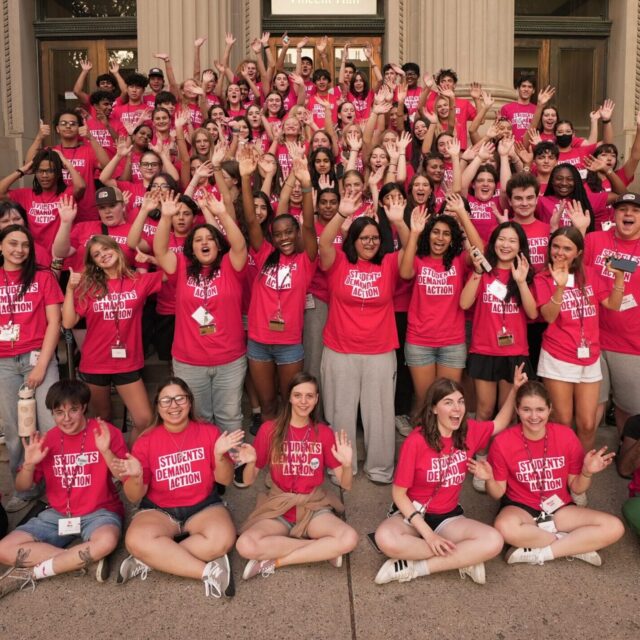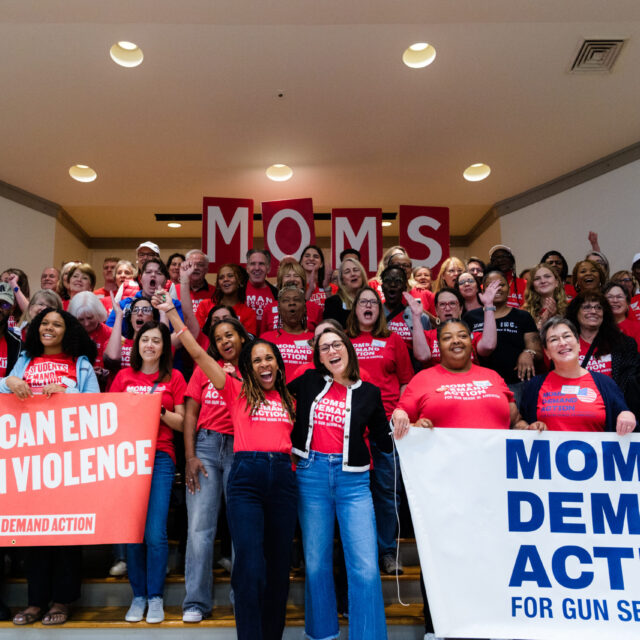
The first time I heard gunshots, I thought they were fireworks—something that was supposed to be beautiful. But in my neighborhood, Lynwood, in South Central, Los Angeles, it was a year-round Fourth of July of gunfire. The shots seemed to be constant. It was never clear where they were coming from, who was shooting them, and if they would one day take the lives of my friends or family members. And the worst part was, gun violence was always swept under the rug. No one talked about it in our neighborhood.
Though I was surrounded by gunfire growing up, it wasn’t until the shooting at Pulse nightclub in Orlando that gun violence felt very personal. When I heard about how 49 people were shot and killed at Pulse in Orlando, it felt like I had a target on my back. I was 13, Latinx, and closeted. Seeing the attack on people who looked like me kept me from embracing myself and coming out to my family and friends. I was scared to live in a country where so much hatred was directed at my community.
For the next few years, I was worried about the gun violence in my community and around the country. When the coronavirus pandemic set in, I knew I needed something to keep me busy during the summer when gun violence tends to increase. That’s when I found the Summer Leadership Academy, a program started by a Students Demand Action volunteer from South Central Los Angeles. The program was started by and for youth of color in our neighborhood. It was empowering to have a space where I felt like I could do something.
Through Students Demand Action and the Summer Leadership Academy, I found a voice for myself. I even created a podcast with two friends from South Central called 3 Homegirls, No Gun. We talk about our experience in the movement, interview special guests, and show our listeners that there are hundreds of ways to make a difference in the gun violence prevention movement. Now, almost a year later, I still hear from students all over South Central about how episodes resonated with them and that they had never heard their story and experiences on a platform like that.
On one hand, that makes me feel like we are making a difference, but on the other, it’s sad that this is the first time many have heard that.
5,300
Each year, nearly 5,300 Latinx people die from gun violence in the US.
Everytown Research analysis of CDC, WONDER, Provisional Mortality Statistics, Multiple Cause of Death, 2019–2023. Latinx defined as all races of Latinx origin.
Last updated: 11.8.2024
Queer voices of color are needed and welcome in the gun violence prevention movement because, sadly, gun violence affects everyone—and it disproportionately impacts the Latinx and queer communities. Every day, more than 100 people are shot and killed and more than 230 are wounded. That is more than 100 families changed, more than 100 people stolen, and countless more affected. Every. Single. Day. Each year, that includes 3,800 Latinxs who die from gun violence in the U.S. and Latinxs are twice as likely to be killed in a gun homicide as white people.
Additionally, LGBTQIA+ youth are at a higher risk of both seriously considering and potentially attempting suicide compared to their peers. And trans people, specifically Black trans women, bear the brunt of gun violence in the LGBTQIA+ community. 2020 was the deadliest year on record for transgender people, and so far in 2021, Everytown for Gun Safety has tracked more violent deaths of transgender and gender non-conforming people than ever by this point in the year.
We deserve better, and we are fighting for it.
Thankfully, that fight is producing wins at all levels of government. At the federal level, the House of Representatives have passed major gun safety bills this session, and the Biden-Harris Administration has nominated David Chipman, a longtime gun sense champion, to lead the Bureau of Alcohol, Tobacco, Firearms and Explosives (ATF). In my home state of California, the state legislature recently approved a budget proposed by Governor Newsom to allot $200 million for community violence intervention groups—making it the largest grant program for community-based violence intervention programs by a state ever. Even locally, the San Jose mayor and city council have proposed a slew of gun safety measures to keep their city safe, just weeks after a tragic mass shooting near a Santa Clara Valley Transportation Authority (VTA) maintenance yard.
Now that Pride Month has come to a close, it’s important to remember that the fight for LGBTQIA+ rights and gun violence prevention in our communities doesn’t stop in June. Gun violence is a queer issue and the movement is a year-round effort. This movement needs more queer voices and leaders. That’s why I am calling on other young queer people to join this movement. We need your voice. Your story matters here. We can make a difference, and we already are.
Join Students Demand Action
We need your voice in our movement. Help end gun violence in America by getting involved with Students Demand Action.
Join UsThe Latest

100 Students, 5 Days, 1 Goal: Grow As Movement Leaders and Organizers

What Does Disability Pride Month Mean to You? Three Members of the Students Demand Action Disabled Students Affinity Group Respond

17 Gun Safety Wins in the 2025 State Legislative Sessions


